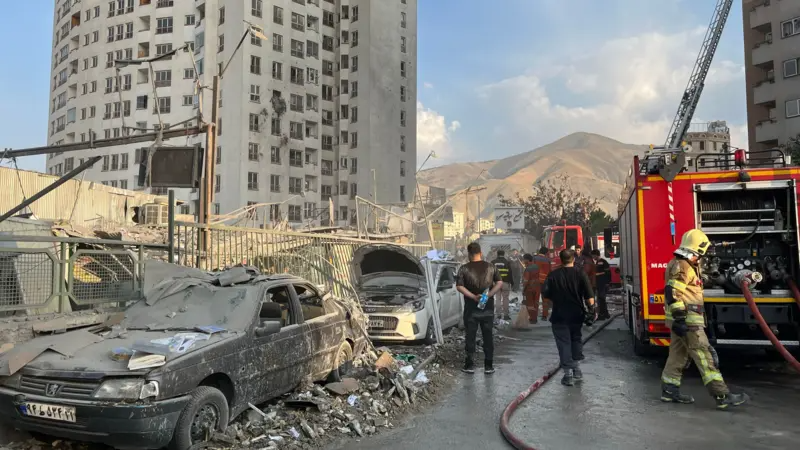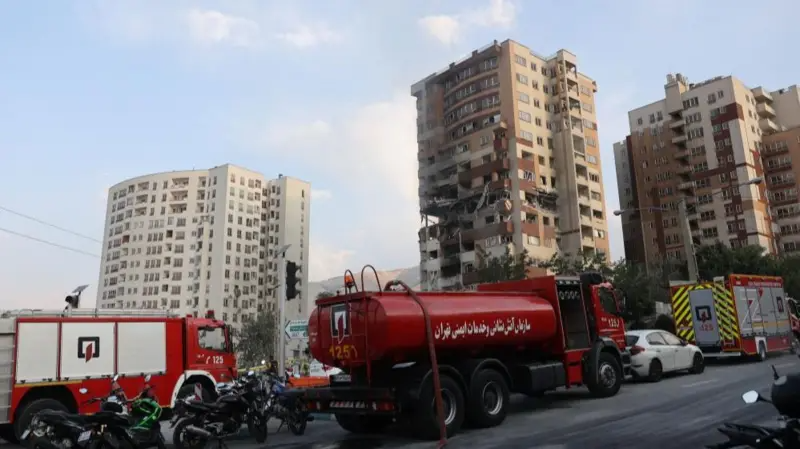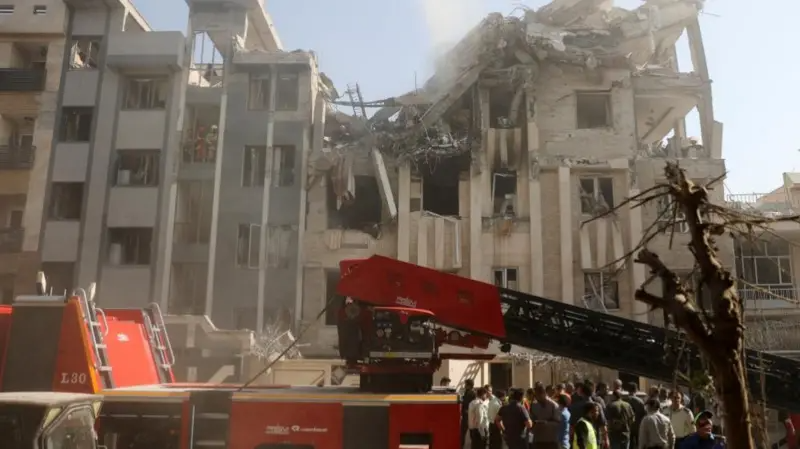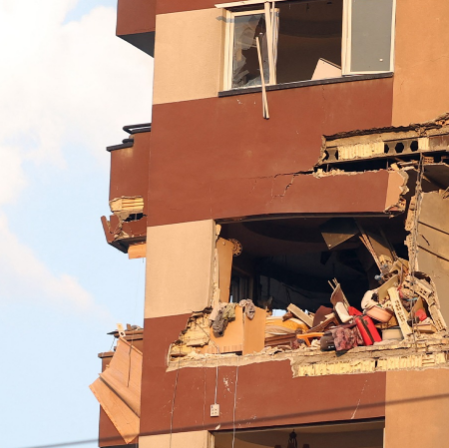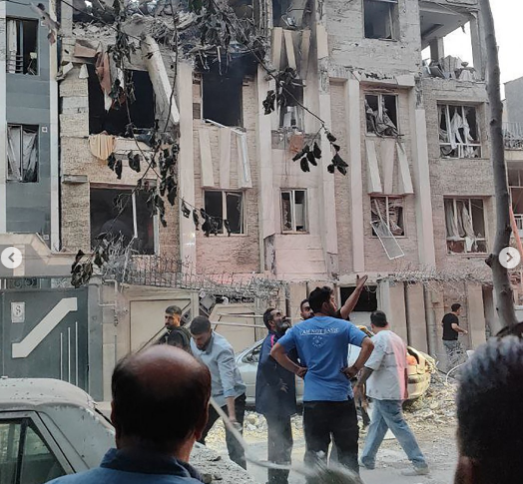Iran's supreme leader yet to acknowledge ceasefire [UPDATED]
![Iran's supreme leader yet to acknowledge ceasefire [UPDATED]](https://www.azernews.az/media/2025/06/22/iran_nuclear_deal.jpg)
Tensions between Israel and Iran escalated dramatically on the late evening of June 13 as Iranian forces launched waves of ballistic missiles targeting Israeli territory, including civilian areas. The strikes came in relation to the Israeli attack in the early hours of the same day, which claimed the lives of civilians, top military commanders, and leading scientists. Read below for more UPDATES>>>
Iran has launched missile attacks on U.S. military bases in
Qatar and Iraq; air raid sirens are sounding in Bahrain and Kuwait.
The UAE has closed its airspace to all aircraft.
Reports have emerged of air raid alerts in Saudi Arabia as
well.
14:05
It was yesterday when some senior Iranian officials and bodies, including the president, confirmed the ceasefire between Iran and Israel.
However, there has yet to be any public acknowledgment from the individual regarded as the most powerful figure in the country: Supreme Leader Ayatollah Ali Khamenei.
The supreme leader usually has the final say on state matters, and eyes inside and outside Iran remain focused on when he will comment on the ceasefire.
Khamenei has reportedly left his usual residence in central Tehran and is now sheltering in a secure bunker, but this hasn't been confirmed by Iran.
He last appeared on state television on 18 June in a pre-recorded message, in which he dismissed US President Donald Trump's call for Tehran’s “unconditional surrender”.
Although his official accounts on X had been active prior to the ceasefire, he has not been seen in public since Israel’s strike on Iran on 13 June, when another pre-recorded message was aired following the attack.
The most recent images showing him in a public setting date back to 11 June, during a meeting with members of the Iranian parliament.
10:54
An Iranian parliamentary committee has approved the general outline of a bill aimed at suspending Iran’s cooperation with the International Atomic Energy Agency (IAEA) in response to the UN nuclear watchdog’s actions in connection with US and Israeli aggression against Iranian territory, Azernews reports via Mehr.
According to Ebrahim Rezaei, spokesman for the parliamentary committee on national security and foreign policy, the aforesaid plan was approved by lawmakers after discussing its details at a session on Monday.
The bill, if approved, would require the Iranian government to suspend cooperation with the IAEA until Tehran is provided with real guarantees of the agency’s professional conduct.
Rezaei said that Iran, according to the plan, cannot cooperate in installing video cameras at its nuclear facilities, conducting inspections, and allowing inspectors to enter there, or submitting reports to the IAEA until the security of all Iranian nuclear facilities is guaranteed.
“The decision was made after the US carried out strikes on several Iranian nuclear facilities, which violate international law, including the UN Charter,” Iranian media reports.
Following the ceasefire between Iran and Israel on Tuesday, IAEA director general Rafael Grossi said he had written a letter to Iranian Foreign Minister Abbas Araghchi, requesting a meeting and stressing the agency’s need to collaborate with Tehran.
10:14
Donald Trump insists nuclear sites in Iran were "completely destroyed" by US military strikes, despite an intelligence report casting doubt on their success
The leaked damage assessment from the Pentagon's Defense Intelligence Agency estimates the attack only set Iran's nuclear programme back "a few months"
Trump's special envoy to the Middle East, Steve Witkoff, calls the leak "treasonous"
Meanwhile, the ceasefire between Israel and Iran seems to be holding, with both nations acknowledging it is in place
But the wars that Trump inherited and promised to end, in Gaza and Ukraine, rage on, writes North America correspondent Anthony Zurcher
15:49
Moments after Air Force One departed with Donald Trump on board, the US president has posted a fresh Truth Social insisting that "the ceasefire is in effect".
Trump writes: "Israel is not going to attack Iran. All planes will turn around and head home, while doing a friendly 'plane wave' to Iran.
"Nobody will be hurt, the ceasefire is in effect! Thank you for your attention to this matter!"
12:51
Iranian state media has responded to Israel’s accusations, saying Iran denies reports that it fired a missile at Israel after the ceasefire began, Azernews reports via BBC.
Iran's Supreme National Security Council has released a statement about "imposing the halt of the war" on Israel and its "terrorist supporters".
The Council warns that "any further aggression will be met with a decisive, firm, and timely response by Iran".
In the statement, the Council praises the Iranian people for their "awareness, resilience and unity", saying the "enemy’s defeat" is down to Iranians’ "firm resolve, strategic patience, and refusal to accept humiliation or one-sided compromise".
The statement also commends Iran and its forces for delivering "decisive and calculated blows" in retaliation for attacks on Iran.
11:58
Iran has breached the ceasefire agreement by launching a missile attack on Israel, the Israel Defense Forces (IDF) announced in a statement released by the Army's press service, Azernews reports.
“Some time ago, sirens sounded in northern Israel after missiles were detected from Iran towards the country,” the statement said, noting that the Israeli Air Force is currently conducting operations and intends to “strike at the locations necessary to eliminate the threat.”
According to Israeli media, air raid alarms were triggered in multiple areas, including the Haifa region, Upper Galilee, Western Galilee, and the Golan Heights. Initial reports indicate that a single missile was launched from Iran towards northern Israel.
The renewed escalation comes despite the recently brokered ceasefire between the two countries, raising fears of a possible return to open hostilities.
10:35
The Israeli government says it agreed to the ceasefire proposal after "achieving the objectives" of its attacks on Iran, Azernews reports.
According to the statement, Israel has removed Iran's "dual immediate existential threat" from nuclear weapons and ballistic missiles.
It also says Israel has "inflicted severe damage on the military leadership, and destroyed dozens of central Iranian government targets".
The statement goes on to say that Israeli forces, in the last day, have "severely struck government targets in the heart of Tehran, eliminating hundreds of Basij operatives" – a militia the Iranian government often uses to suppress protests – and "eliminating another senior nuclear scientist".
"Israel thanks President Trump and the United States for their support in defence and their participation in eliminating the Iranian nuclear threat," the statement adds.
21:15
What to know:
- U.S. ATTACKS IRAN: The U.S. entered the conflict between Israel and Iran overnight, with American warplanes and submarines firing on three nuclear facilities in Iran: Fordo, Natanz and Isfahan.
- DETAILS OF STRIKES: The U.S. is calling the military strikes against Iran Operation Midnight Hammer. According to a defense official, more than 125 U.S. military aircraft participated in the operation. It was the largest B-2 operational strike in U.S. history and the second-largest B-2 mission ever flown, only exceeded by missions after 9/11.
- U.N. SECURITY COUNCIL: The council is expected to hold an emergency meeting at 3 p.m. at the request of Tehran, U.N. sources tell NBC News.
- TRUMP ADDRESS: In an address to the nation shortly after the attacks, President Donald Trump said the sites were “completely and totally obliterated,” adding that any future attacks would be “far greater and a lot easier.”
- STRAIT OF HORMUZ: The Iranian parliament is moving to close the Strait of Hormuz following the U.S. attack on three of the country’s nuclear sites, according to Iranian-state owned media.
- RISK OF ESCALATION: Iran says it “reserves all options” to respond to the U.S. attacks. United Nations chief António Guterres urged restraint and de-escalation, saying “at this perilous hour, it is critical to avoid a spiral of chaos.” Trump said any retaliation from Iran on U.S. assets "will be met with even greater force than what was unleashed today."
- RETALIATORY STRIKES: Iran launched a missile barrage into Israel this morning,causing damage and injuries in Tel Aviv, while Iran's allies in Yemen, the Houthis, said they will join Iran in retaliation.
- U.S. DEBATE: Democrats have questioned the legality of the strikes, with Senate Minority Leader Chuck Schumer D-N.Y., saying, “No president should be allowed to unilaterally march this nation into something as consequential as war with erratic threats and no strategy.”
- HUNDREDS KILLED: Since the conflict began 10 days ago, Israeli strikes have killed at least 400 people in Iran and injured 3,000, according to Iran’s health ministry. The death toll in Israel from Iran’s retaliatory strikes remains at 24.
16:16
Israel strikes IRGC headquarters.
Israeli army: We targeted the leadership of the "Thar Allah Corps," a unit of the Revolutionary Guard responsible for security in Tehran. We targeted the leadership of the "Thar Allah Corps," a unit of the Revolutionary Guard responsible for security in Tehran, Azernews reports via SkyNewsArabia.
14:07
Russian President's meeting with Iranian Foreign Minister Araghchi kicks off at the Kremlin.
Russia aims to assist the Iranian people. Putin calls the strikes on Iran unprovoked and unjustifiable aggression.
13:34
Israeli Air Force launches series of strikes on military facilities in Tehran
The Israeli attacks targeted the Basij headquarters, the Sayyid al-Shohada Corps, the Sarallah headquarters, the Alborz Corps, the Intelligence Protection of the Police Force Command, and the Police Force Intelligence Headquarters.
23 June/ 10:44
Several senior Iranian military leaders have threatened to respond to the US strikes.
Iranian media has released a video showing Iran's commander in chief, Amir Hatami, speaking to fellow officers in an operations room.
In the video, he says every time the US has committed "crimes" against Iran in the past, they "received a decisive response, and this time it will be the same".
Meanwhile, the Iranian army's chief of staff, Abdolrahim Mousavi, has put out a statement saying the US has opened up the possibility of his forces taking "any action" against US troops. He adds that Iran "will never back down".
21:17
U.S. government personnel in Turkey are being instructed to "maintain a low profile" and avoid personal travel to the U.S. Consulate in Adana "due to regional events," according to a security alert issued by the U.S. Embassy & Consulates in Türkiye today.
"Negative sentiment toward U.S. foreign policy may prompt actions against U.S. or Western interests in Türkiye," they warned. "In the past, such activities have included demonstrations, calls for boycotts of U.S. businesses, anti-U.S. rhetoric, and graffiti. Large gatherings may result in enhanced police presence, road closures, and traffic disruptions. Any gathering, even those intended to be peaceful, could escalate and turn violent on short notice."
13:27
Iran has said it cannot return to negotiations that were destroyed by Israel and the United States, Azernews reports.
In a post on X, Iran’s Deputy Foreign Minister Seyyed Abbas Araghchi wrote that Tehran had been in talks with the U.S. last week when Israel decided to sabotage the diplomatic process.
He added that this week, as Iran was engaged in dialogue with three European countries — the UK, France, and Germany — along with the European Union, Washington once again undermined diplomacy.
“The UK and the EU’s foreign policy chief believe Iran should return to the negotiating table,” Araghchi said. “But how can Iran return to a table it never left — one that’s already been destroyed?”
The statement comes amid rapidly escalating tensions. On the morning of June 13, Israel launched airstrikes on Iran, reportedly killing several high-ranking military officers, generals, nuclear scientists, and other officials.
That same evening, Iran responded with its ‘True Promise III’ operation, firing hundreds of ballistic missiles and drones at multiple locations in Israel, including Tel Aviv.
The escalation continued overnight, when U.S. forces carried out airstrikes on three Iranian nuclear facilities, reportedly destroying them.
12:55
The UN’s nuclear watchdog - the International Atomic Energy Agency (IAEA) - has just released a statement saying there has been "no increase in off-site radiation levels" reported after the US struck three nuclear sites in Iran.
"IAEA will provide further assessments on the situation in Iran as more information becomes available," it says.
22.06.2025 / 06:20
The United States launched airstrikes on three Iranian nuclear facilities, President Donald Trump announced Saturday evening, hailing the operation as a "spectacular military success."
In a televised address from the White House, Trump said U.S. forces had conducted precision strikes targeting Fordow, Natanz, and Esfahan—three critical components of Iran’s nuclear infrastructure. "Our mission was to eliminate Iran’s nuclear enrichment capability and end the nuclear threat posed by the world’s leading state sponsor of terrorism," Trump declared.
Earlier, the president took to Truth Social to reveal that a “full payload of bombs” had been dropped on Fordow, Iran’s primary enrichment facility. He also noted that all U.S. aircraft involved in the operation had safely exited Iranian airspace.
19.06.2025/ 10:19
More than 30 injured, Israel's emergency service says
Israeli hospital damaged and injuries reported after direct hit by Iranian missile
The spatbetween Israel and Iran has taken a dramatic and dangerous turn, with direct strikes reported on both sides and a potential US intervention hanging in the balance, Azernews reports.
According to Israel's Foreign Ministry, a hospital in Beersheba suffered a direct hit from Iranian missile strikes, marking one of the most severe escalations since the exchange of hostilities began. Air raid sirens sounded overnight across Israeli cities, and while initial shelter-in-place orders have been lifted, the atmosphere remains tense.
In a retaliatory move, Israel has issued evacuation warnings near Iran's Arak heavy water reactor, signaling that military infrastructure in the area could be targeted imminently.
Meanwhile, in Washington, President Donald Trump confirmed that he has approved military plans to strike Iran, though a final decision is still pending. Speaking to reporters, Trump stated, “I may do it, I may not do it,” leaving the door open for possible US military involvement alongside Israel.
Iran's Supreme Leader has responded with a stern warning to the US, saying any intervention would cause "irreparable harm", raising the risk of a wider regional war.
With strategic energy infrastructure, civilian populations, and international alliances now involved, the situation has entered a critical phase. Global actors are calling for restraint, while regional powers brace for the possibility of further escalation.
********************
19:08
Israel reportedly targets area where Iran’s Supreme Leader Khamenei is taking refuge, according to Israeli media.
Moreover, Internet down nationwide in Iran. Two Iranian government planes left the country.
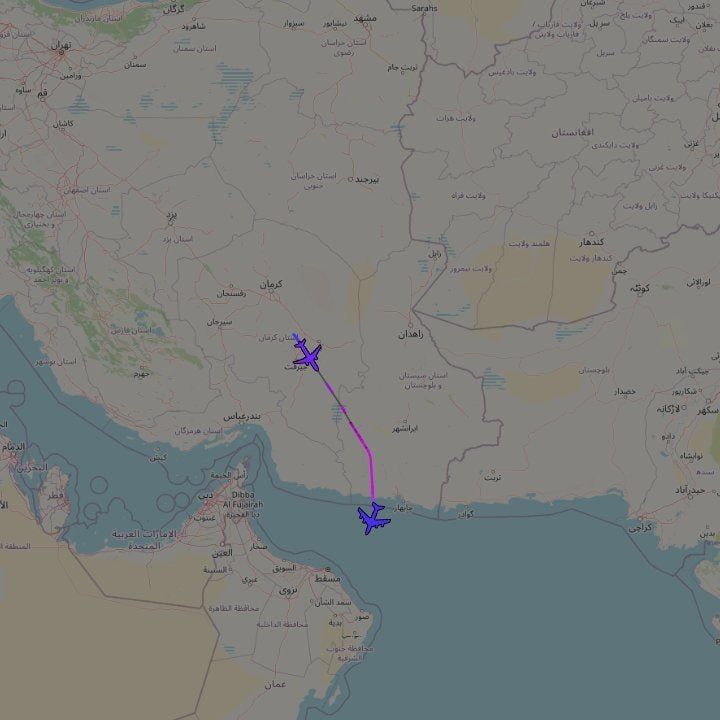
17:20
Iranian security forces found camouflaged vehicles used to store attack drones/UAVs against Iranian targets. The vehicle in the video was captured in Alborz Province, which is west of Tehran Province
Iranian security forces found camouflaged vehicles used to store attack drones/UAVs against Iranian targets.
— Clash Report (@clashreport) June 18, 2025
The vehicle in the video was captured in Alborz Province, which is west of Tehran Province. pic.twitter.com/aYlHYmotBT
15:38
Two centrifuge production facilities in Iran have been hit during Israel airstrikes — a workshop in Karaj and the Tehran Nuclear Research Centre — according to the International Atomic Energy Agency
13:15
Iran has conveyed to Washington that it will respond firmly to the United States if it becomes directly involved in Israel's military campaign, the Iranian ambassador to the United Nations in Geneva said, according to Reuters.
Ali Bahreini told reporters that he saw the U.S. as "complicit in what Israel is doing". Iran would set a red line, and respond if the United States crosses it, he said, without specifying what actions would provoke a response.
11:33
The International Atomic Energy Agency (IAEA) has not yet found any evidence of Iran's attempts to develop a nuclear weapon.
Azernews reports, citing the Tasnim agency, that IAEA Director General Rafael Grossi made this statement in an interview with CNN.
In the interview, he addressed allegations regarding the timeframe in which Iran could create a nuclear weapon: "This is certainly not a matter of tomorrow, perhaps even the next few years. These are just assumptions."
The IAEA Director General reiterated the agency's position that its inspectors were not fully aware of all of Iran's peaceful nuclear activities, stating: "What I have said so far is this - I have not seen evidence of an organized movement towards the production of nuclear weapons."
17.06.2025/ 21:35
A huge explosion has just rocked Tehran.
BREAKING
— Barzan Sadiq (@BarzanSadiq) June 17, 2025
A huge explosion has just rocked #Tehran. pic.twitter.com/Su34vOFjCs
11:14
Three civilian vessels are ablaze near the Strait of Hormuz, off the coast of Iran, according to Telegram channels. No official statement has been yet made.
10:42
Israel also announced the death of Ali Shadmani, the newly appointed Chief of Staff of the Iranian Armed Forces, who took office just four days ago.
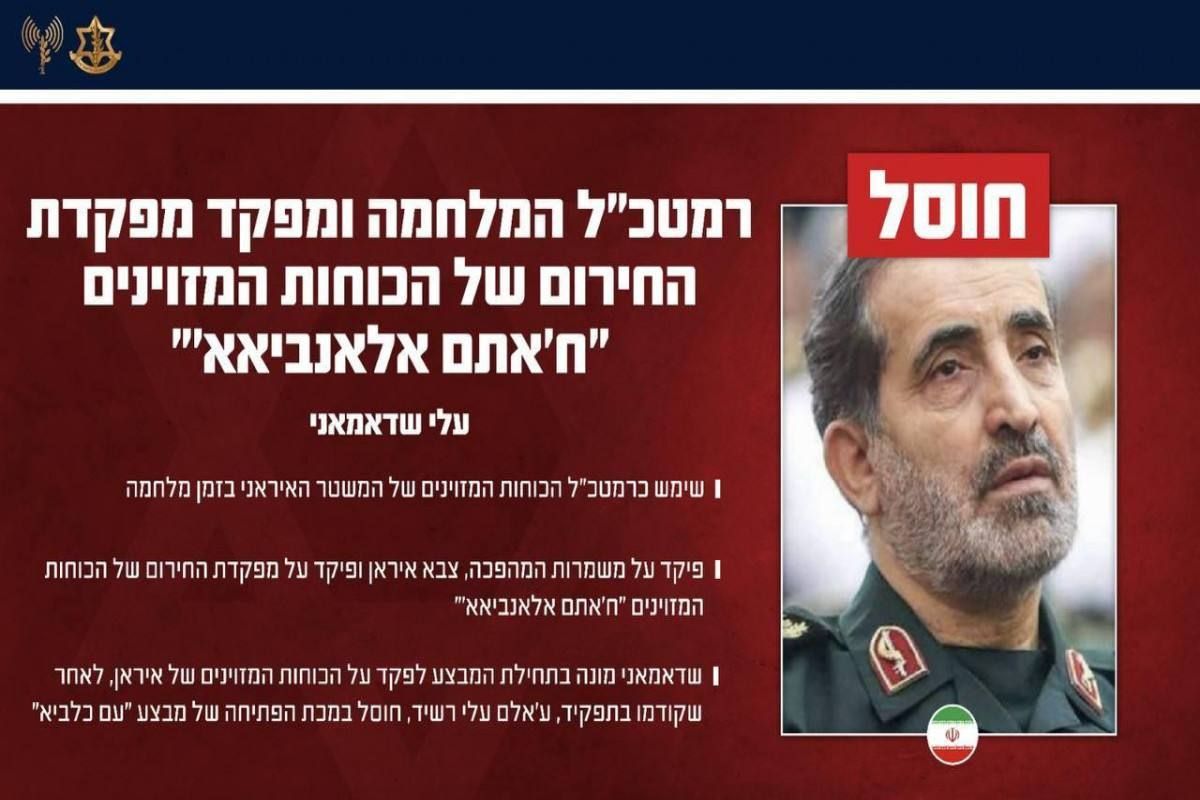
10:20
Iran International releases a video it claims shows an Israeli airstrike this morning on the western city of Tabriz.
#عاجل |
— South24 | عربي (@South24_net) June 17, 2025
إيران إنترناشونال تنشر فيديو قالت إنه يظهر غارة جوية إسرائيلية صباح اليوم على غرب مدينة تبريز
#south24 pic.twitter.com/YfrkyBBruf
00:55
Iranian armed forces have resumed missile strikes on targets in Israel.
Iran’s Tasnim news agency reported this.
The exact number of munitions fired at Israel has not been disclosed.
20:10
Tehran State Television has been hit by missile strike according to Iranian media.
16:56
IDF claims full control of Tehran’s airspace, launches fresh strikes in central Iran, according to Times of Israel.
The Israeli Air Force has begun a new wave of airstrikes in central Iran, a military official says.
Israel “controls the skies over Tehran,” Prime Minister Benjamin Netanyahu says, echoing statements by the IDF spokesman earlier in the day.
“This is a change in the entire campaign,” he continues during a visit to the Tel Nof Airbase in central Israel, joined by Defense Minister Israel Katz and IDF Chief of Staff Lt. Gen. Eyal Zamir.
Netanyahu says Israel is “on the way” to achieving its goals of destroying the Iranian nuclear and ballistic missile threats.
“When we control the skies over Tehran, we are hitting these targets, the targets of the regime, unlike the criminal regime of Iran that targets our citizens and comes to kill children and women,” he says.
Israel, in contrast, is telling Tehran’s residents to “get out” while the IAF strikes targets in the capital, says Netanyahu.
15:03
The International Atomic Energy Agency convened an urgent board meeting, following a request from Russia, after Israeli airstrikes on Iran damaged 4 critical structures at the Esfahan nuclear site
14:42
Iranian media reported an explosion on the Tehran–Qom highway, forcing vehicles to change course. An Israeli airstrike also targeted the area near Shahrak-e Gharb in western Tehran, according to videos received by Iran International.
13:24
Iranian President Masoud Pezeshkian stated that while Iran has never pursued nuclear weapons, the country is not afraid to use nuclear energy for peaceful purposes. His remarks were made during a session of the Iranian parliament on June 16, as lawmakers considered a vote of confidence in the new Minister of Economic Affairs and Finance, Azernews reports.
“Iran has the right to use nuclear energy and research for the benefit of its citizens. No one can take this right from Iran. We have stood with all our might to obtain this right and are not afraid of any power in this regard,” Pezeshkian declared.
Referring to ongoing diplomatic efforts, he emphasized that Iran has remained committed to the policy outlined by Supreme Leader Ayatollah Ali Khamenei, including engaging in indirect discussions with the United States over its nuclear program. “This once again proves that Iran is not pursuing nuclear weapons,” Pezeshkian said, adding that the recent Israeli attack violated international law and undermined diplomacy.
The President’s statement comes in the aftermath of Israel’s airstrikes on June 13, which targeted high-ranking Iranian military figures and nuclear scientists. The attack resulted in the deaths of key figures such as Chief of Staff of the Iranian Armed Forces Mohammad Bagheri, IRGC Commander-in-Chief Hossein Salami, and other senior officials and scientists.
It was also noted that five rounds of indirect talks between Iran and the US were held in April and May 2025, with mediation by Oman’s Foreign Minister Seyyed Badr Albusaid. These meetings took place in Muscat and Rome and were led by Iranian Foreign Minister Seyyed Abbas Araghchi and US Special Representative for Middle East Affairs Steve Whitkoff.
10:27
Five people were killed in Iran's ballistic missile strikes on Israel last night, according to Meign David Adoma, a local rescue service official.
The latest victim was retrieved from the rubble of a high-rise building in the Petah Tikva district. Three other casualties were found at the scene, while one person was reported dead in the city of Bnei Brak, where a rocket strike caused widespread destruction in a residential area.
Rescue services reported that 92 people were hospitalized due to the overnight attacks, most with minor injuries.
01:23
According to reports from Azernews, Hossein Kirmanpour, the head of the Information Center at Iran's Ministry of Health (MoH), stated on social media that 224 people have died due to the Israeli Defense Forces (IDF) attack in Iran.
He also mentioned that 1,481 individuals have been hospitalized in the past 65 hours, with more than 90% of them being civilians. Kirmanpour indicated that 522 people have been discharged from hospitals, while 224 have tragically lost their lives.
Additionally, the Human Rights Activists in Iran organization, based in Washington, previously claimed that at least 406 people were killed and 654 were injured as a result of the IDF strikes.
17:20
Israeli media: Iranian bombing targeted the power station in Hadera and the Netanyahu family's residence in Caesarea.
17:10
Smokes rising over the Iranian Navy headquarters area in Tehran.
NEW: Smokes rising over the Iranian Navy headquarters area in Tehran. pic.twitter.com/aeA5qODJme
— Clash Report (@clashreport) June 15, 2025
15:05
A source in the Israeli security cabinet told Channel 15 that Israel may witness things that exceed what was seen yesterday, and Israel will increase its strikes.
13:50
Two individuals arrested in Alborz Province, west of Tehran, who allegedly had worked with Mossad to manufacture bombs, explosives, and electronic equipment.
10:40
Iranian government spokeswoman: Military operations against Israel are an appropriate punitive measure to fulfill our rights.
10:10
According to Israeli officials an Iranian ballistic missile hit a
building in the central city of Bat Yam overnight and killed four
people, including two children, and wounded nearly 100 others.
Another missile impact in Rehovot wounded 37. Among the wounded,
six are listed in serious condition.
00:55
Air raid sirens blare in Haifa as Iran launches missile
barrage
Warning sirens were activated in the Haifa region following a wave
of Iranian missile strikes, signaling a continued escalation in the
conflict between the two countries.
Iran and Israel exchange missile attacks and airstrikes as their
escalating conflict shows no signs of resolution.
So far, the violence has claimed the lives of at least 80 people in
Iran, including 20 children, and four in Israel, with hundreds more
injured in both countries amid the continued retaliatory
assaults.
22:19
Prime Minister Benjamin Netanyahu in a video statement: "Very soon, you will see Israeli Air Force jets over the skies of Tehran. We will strike every site and every target of the Ayatollah regime", according to Clash Report.
**********************
Trump told Putin in a phone call that his envoy Witkoff is ready to resume nuclear talks with Iran's Foreign Minister Araghchi.
20:00
The IDF announces that the chiefs of Iran's military intelligence and the IRGC's ballistic missile array were killed in recent strikes.
In all, some 20 top military Iranian commanders have been killed since Israel launched its operation against Iran on Friday, the IDF says.
Gholam-Reza Marhabi, head of the intelligence department of the Iranian Armed Forces, was killed in Israel's opening strikes early Friday, the IDF says.
The IDF says he "was responsible for intelligence situational assessments for the Iranian Armed Forces and was considered Iran's most senior intelligence officer."
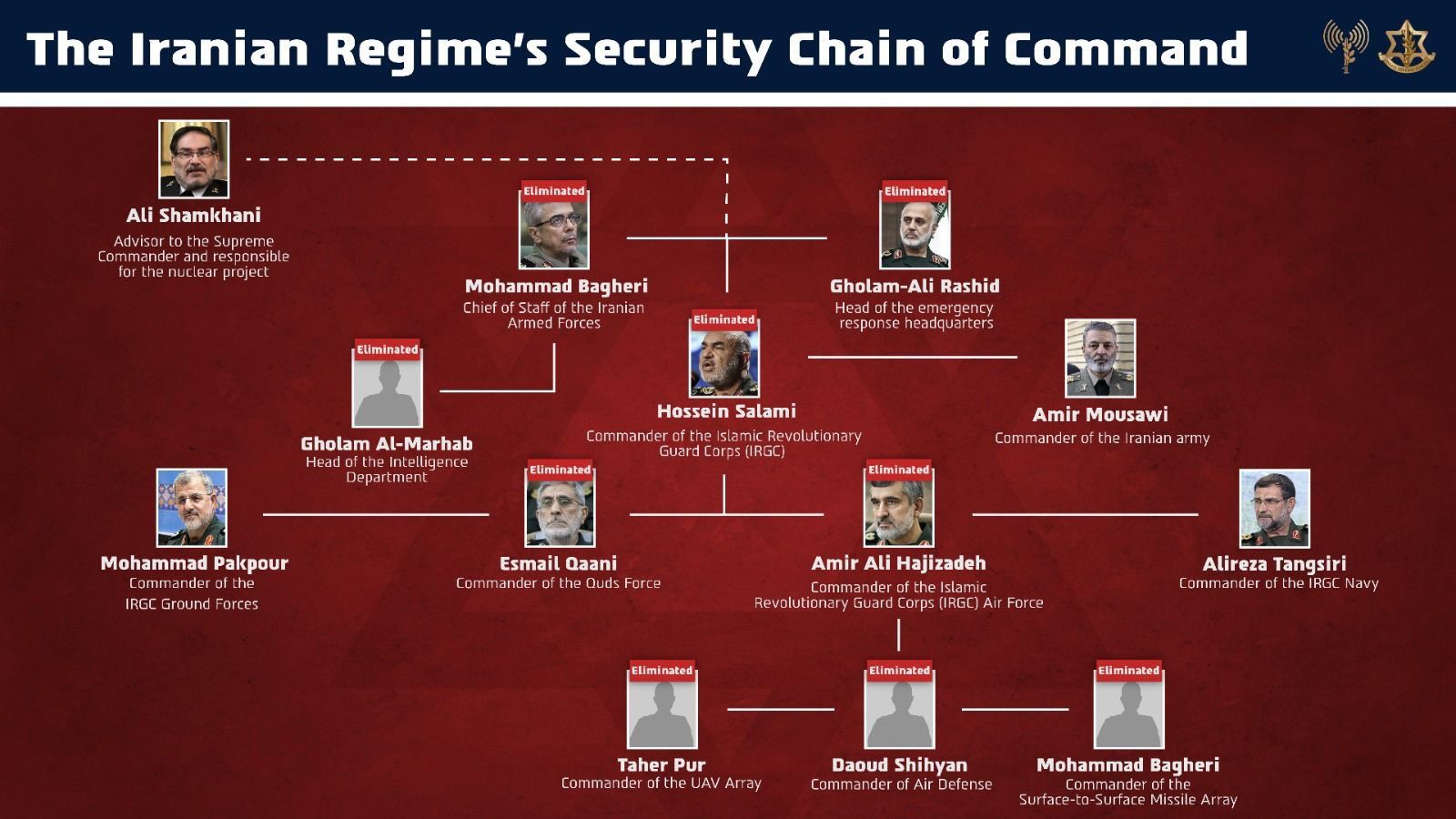
"Marhabi played a key role in intelligence evaluations, operational planning, and combat preparations against Israel in the past year and before," the military says, adding that he was a "highly respected senior figure within the regime's security organization and a close associate of" Mohammad Bagheri, the Armed Forces chief of staff who was also killed on Friday.
Additionally, the IDF says a strike on Friday killed "the commander of the IRGC's Surface-To-Surface Missile Array, Mohammad Bagheri."
The IDF says Bagheri "oversaw most of Iran's long-range surface-to-surface and cruise missile capabilities."
Bagheri was killed alongside the commander of the IRGC air force and other top commanders in the unit while meeting at an underground command center to prepare to attack Israel, according to the IDF.
16:37
IDF claims deep strike into Iran signals shift in regional power dynamics
The Israel Defense Forces (IDF) announced the successful completion of several waves of airstrikes deep inside Iranian territory, calling it the "deepest Israeli strike ever carried out in Iran."
According to a statement released by the IDF, the Israeli Air Force targeted more than 150 sites and nearly 400 military components in overnight operations. Seventy fighter jets operated over Tehran alone, hitting over 50 targets, including missile systems.
The IDF also revealed that Israeli pilots maintained air operations over the northwestern city of Tabriz for approximately 2.5 hours, indicating a significant breach of Iranian airspace. “Dozens of aircraft have been operating freely over the city since the operation began,” the statement read.
Military officials emphasized that this unprecedented strike was the result of years of planning and coordination between the Air Force and the Intelligence Directorate.
“Tehran is no longer invulnerable. This level of air superiority will help deter future threats,” the IDF added, underlining a major strategic message to Iran and other regional actors.
The operation marks a turning point in the long-standing hostilities between Israel and Iran, raising serious concerns about further escalation and regional security.
15:15
On June 13, Israeli fighter jets, under the direction of military intelligence, simultaneously struck dozens of targets across Iran as part of the initial massive salvo of the operation, according to the IDF’s official Telegram channel.
During the opening phase of Operation "Rising Lion", the Israeli Air Force eliminated nine senior scientists and experts involved in advancing Iran’s nuclear weapons programme. All the individuals held key positions and had decades of experience contributing to the development of nuclear weaponry.
Among those killed were top figures in Iran’s nuclear project:
Fereydoun Abbasi – Nuclear engineering specialist
Mohammad Mahdi Tehranshi – Physics expert
Akbar Motalebi Zadeh – Chemical engineering specialist
Saeed Barji – Materials engineering expert
Amir Hassan Fakhahi – Specialist in physics
Abd al-Hamid Minoushehr – Reactor physics expert
Mansour Asgari – Expert in physics
Ahmad Reza Zolfaghari Daryani – Specialist in nuclear engineering
Ali Bakhouei Katirimi – Mechanics expert
The IDF stated that these individuals played a central role in Iran’s progress toward nuclear weapons capability, and their elimination constitutes a significant blow to the country’s WMD ambitions.
11:44
The General Staff of the Iranian Armed Forces reported the death of two deputy chiefs of the General Staff as a result of Israeli airstrikes, Azernews reports citing Mehr.
Deputy Chief of the General Staff for Intelligence Gholamreza Mehrabi and Deputy Chief for Operations Mehdi Rabbani were killed.
*************************
The Israeli Air Force continues to strike dozens of ground-to-ground missile launchers in Iran, the IDF reported.
יל האוויר ממשיך לתקוף עשרות משגרי טילי קרקע-קרקע באיראן pic.twitter.com/c4n0lLsz1L
— צבא ההגנה לישראל (@idfonline) June 14, 2025
10:18
The Israel Defense Forces (IDF) announced that the Israeli Air Force carried out overnight strikes on dozens of surface-to-air missile infrastructure sites in Tehran, as part of an effort to weaken Iran’s air defence capabilities in the capital.
According to Air Force Commander Major General Tomer Bar: “Following a tense day in which we struck hundreds of targets, we launched a wave of precision strikes of operational and national significance over Tehran’s skies — enhancing our air superiority and freedom of action in Iran.
For the first time since the war began, dozens of Israeli Air Force fighter jets flew over the skies of Tehran — more than 1,500 kilometres from the State of Israel — and struck defensive installations in the Iranian capital.”
09:40
The Israel Defense Forces (IDF) reported that after air raid sirens sounded between 08:11 and 08:12 in the Judea and Dead Sea regions, several drones launched toward Israel were intercepted by the Israeli Air Force.
09:37
The IDF addressed the Israeli public: “A short while ago, sirens sounded in several areas across Israel following the identification of UAVs launched from Iran toward the State of Israel.
The public is asked to follow the instructions of the Home Front Command. At this time, the IAF is operating to intercept and strike wherever necessary to eliminate the threat.”
09:31
At least four people have been killed and another 70 injured as a result of Iran's retaliatory missile strikes on Israel, The Jerusalem Post reported, citing emergency medical services.
09:26
Iran believes that negotiations between Washington and Tehran on resolving the crisis over its nuclear programme have become meaningless following the Israeli attack, according to Esmail Baghaei, spokesperson for the Islamic Republic’s Foreign Ministry, as reported by Reuters.
“The other side (the U.S.) acted in a way that makes dialogue meaningless. You cannot claim to negotiate and at the same time divide work by allowing the Zionist regime (Israel) to target Iran's territory,” he said.
09:23
The number of casualties from Iran’s missile strikes on Israel remains relatively low, despite extensive material damage, according to the commander of the Tel Aviv military district.
“Thanks to civilians following evacuation instructions, the number of injured remains relatively small, and all injuries are minor considering the scale of the destruction,” the Israeli army quoted the commander as saying via its official Telegram channel, without naming him.
08:24
Two people were killed and at least 70 injured as a result of four waves of Iranian missile strikes on Israel, The Jerusalem Post reported, citing emergency medical services. According to the report, one person was killed and 19 others wounded after a missile directly hit residential buildings in central Israel on the morning of June 14.
Earlier, it was reported that a woman injured during the first wave of Iranian missile attacks on the evening of June 13 died from her wounds at a hospital in a suburb of Tel Aviv, where she had been admitted in critical condition after the strike.
22:10
Iran launched missiles at Israel. Some of them were intercepted, but others hit their targets.
21:57
Israeli military: We destroyed a uranium metal production facility, enriched uranium conversion infrastructure, and laboratories in Isfahan.
الجيش الإسرائيلي: دمرنا منشأة لإنتاج اليورانيوم المعدني وبنية تحتية لتحويل اليورانيوم المخصب ومختبرات في أصفهان
— سكاي نيوز عربية-عاجل (@SkyNewsArabia_B) June 13, 2025
21:21
Israel carried out airstrikes on the city of Fardis, located in Iran’s Alborz Province in the north of the country, Press TV reports.
“The Israeli airstrikes targeted positions in the city of Fardis in Alborz Province,” the broadcaster stated.
21:01
At least 18 people have been killed in East Azerbaijan Province in northwestern Iran as a result of strikes by the Israeli Armed Forces, the Iranian agency IRNA reports.
According to the agency, another 35 people have been injured. It is noted that Israeli forces targeted several sites in the province, including at least seven in the vicinity of the city of Tabriz.
20:27
Air defence across all of Iran was activated on the evening of June 13 following new airstrikes on Tehran, according to Iranian state television.
According to Press TV, missiles were intercepted south of Tehran, while Iranian television reported new strikes on the western districts of the capital.
Also, according to IRIB, strikes were carried out on the city of Karaj, located near Tehran.
18:40
Global air traffic was disrupted following Israeli strikes on Iran on June 13, as several major airlines suspended flights to and from locations in the Middle East and rerouted their aircraft, CNN reports, citing the flight tracking website Flightradar24.
The airspace over Iran and Israel, as well as over Jordan, Syria, and Iraq, was largely cleared of commercial flights on June 13.
Tehran’s Mehrabad Airport, Tel Aviv’s Ben Gurion Airport, and Queen Alia International Airport in Amman were all closed on June 13. Mehrabad Airport will remain closed until 2:00 PM on June 14, according to the state news agency IRNA.
17:38
President Donald Trump told CNN in a brief phone call Friday morning that the United States “of course” supports Israel and called the country’s strikes on Iran overnight “a very successful attack,” while warning Iran to make a nuclear deal, Azernews reports via CNN.
When asked about a statement from Secretary of State Marco Rubio on Thursday that sought to put distance between the US and the Israeli action, Trump told Dana Bash: “We of course support Israel, obviously, and supported it like nobody has ever supported it.”
The president went on to urge Iran to reach a deal.
“Iran should have listened to me when I said — you know, I gave them, I don’t know if you know but I gave them a 60-day warning and today is day 61,” he told CNN.
“They should now come to the table to make a deal before it’s too late. It will be too late for them. You know, the people I was dealing with are dead, the hardliners,” the president said. He would not specify which people he was referring to.
Trump is set to speak to Israeli Prime Minister Benjamin Netanyahu on Friday, according a US and an Israeli official.
The president had warned Iran earlier on Friday to agree to a nuclear deal “before there is nothing left,” suggesting in a social media post that subsequent Israeli attacks on the country will be “even more brutal.”
The post marked Trump’s first public comments since Israel launched strikes on Iran targeting its nuclear program and military leaders, with the US president saying he had tried to steer Iranian leaders toward diplomacy, but they failed to act at great cost.
“I gave Iran chance after chance to make a deal. I told them, in the strongest of words, to ‘just do it,’ but no matter how hard they tried, no matter how close they got, they just couldn’t get it done,” Trump wrote.
Trump wrote that Iranian leaders “didn’t know what was about to happen. They are all DEAD now, and it will only get worse!”
“There has already been great death and destruction, but there is still time to make this slaughter, with the next already planned attacks being even more brutal, come to an end. Iran must make a deal, before there is nothing left,” Trump added.
In contrast to Trump’s aggressive tone, Rubio clarified in a statement late Thursday that the US had no involvement in the strikes.
“Tonight, Israel took unilateral action against Iran. We are not involved in strikes against Iran and our top priority is protecting American forces in the region,” Rubio said.
The Trump administration is, meanwhile, still hoping that a sixth round of nuclear deal talks with the Iranians will take place in Oman on Sunday as previously scheduled, according to two sources familiar with the matter.
Special Envoy Steve Witkoff was in touch with the Omanis overnight in an effort to keep the plans for this weekend on track, sources said. But those sources acknowledged that holding the talks this weekend is highly unlikely. Oman has facilitated the US-Iran talks to date.
Despite several rounds of talks between Iran and the US to thrash out a new nuclear deal, major sticking points remain, with Iran insisting on its right to nuclear enrichment. Trump said earlier this week that he’s grown less confident of being able to strike a deal, saying in an interview earlier this week that Tehran could be “delaying” an agreement.
Trump warned of possibility of ‘massive conflict’ in Middle East
Trump had warned earlier on Thursday of the possibility that “massive conflict” in the Middle East that could take place “soon.”
US officials were increasingly concerned that the risk of Israel striking Iran had risen after Tehran said on Thursday that it would ramp up its nuclear activities due to the International Atomic Energy Agency passing a resolution saying that the country was not in compliance with its non-proliferation commitments, senior US officials told CNN.
Questioned about a potential strike earlier on Thursday, Trump said it “could very well happen.”
“I don’t want to say imminent, but it’s something that could very well happen,” Trump told reporters at the White House.
US embassies in the Middle East carried out emergency action assessments this week, and that process is ongoing as the US monitors the threat environment in the region, the officials said.
Asked what the Israelis told him to prompt the departure of US personnel from the region, Trump replied: “They didn’t tell me anything, but I said look, there’s a chance of massive conflict.”
He described the deliberations that led him to the decision.
“We have a lot of American people in this area, and I said, look, we gotta tell them to get out cause something could happen – soon. And I don’t want to be the one that didn’t give any warning and missiles are flying into their buildings. It’s possible. So I had to do it. You know, I had the choice – do I do it or not? Doing it has its downside but it also has its upside, like you’re going to save a lot of lives if it should happen. Hopefully that doesn’t happen.”
Later Thursday, Trump in a Truth Social post underscored his preference for diplomacy in Iran, saying his administration remains “committed to a Diplomatic Resolution to the Iran Nuclear Issue!”
Trump also said he does not want Israel to target Iran as negotiations on a potential nuclear deal continue, with a sixth round of talks set for Sunday in Oman.
“I want to have an agreement with Iran. We’re fairly close to an agreement. … As long as I think there is an agreement, I don’t want them going in because that would blow it. Might help it, actually, but also could blow it,” he said when asked about a potential Israeli strike.
16:03
A loud explosion was reported near Hamadan, northwestern Iran, according to a local news reporter from Mehr News Agency, Azernews reports.
The sound originated from the vicinity of the Noje Airbase in Kabudarahang, west of Hamadan city. Details about the cause of the explosion remain unclear.
15:08
Iranian president vows strong response to Israeli strike, warns of consequences
Iran’s newly elected President Masoud Pezeshkian has declared that Iran’s retaliation to Israel’s recent attack will be forceful enough to make it regret its actions. His remarks came in a televised address to the nation, following Israeli airstrikes that reportedly killed several high-ranking Iranian officials and civilians.
Azernews, citing Tasnim News Agency, reports that Pezeshkian condemned the attack as a violation of international law and a reflection of Israel’s aggressive nature.
“Of course, the Iranian people and the country's leadership will
not remain silent, and Iran's legal and strong response will make
them regret this action,” Pezeshkian stated.
“Iran will act decisively to respond to the attack and legally
defend the country's integrity, just as it has made all efforts for
peace and tranquility in the world and the region.”
He emphasized that while Iran has consistently sought diplomatic paths, including negotiations and global confidence-building, the recent developments require a firm response.
Pezeshkian also urged the Iranian public to remain vigilant and not fall for disinformation amid rising tensions:
“I ask the Iranian people to maintain their unity, integrity, and solidarity, and not pay attention to rumors and false news. They should cooperate with the state so that the country can emerge stronger from this situation.”
His statement comes at a time of heightened regional volatility, with international observers warning of potential escalation following Israel’s strikes on Iranian territory.
به محض وقوع حمله جنایتکارانه رژیم صهیونی تاکنون، رئیسجمهور و تیم دولت مدیریت صحنه را برعهده گرفته و جلسه ویژه هیات دولت هم در این زمینه برگزار شده است؛ دکتر پزشکیان بزودی با مردم صحبت خواهد کرد
— Masoud Pezeshkian (@drpezeshkian) June 13, 2025
به امید خدا رژیم صهیونی از اقدام امروز خود پشیمان خواهد شد.
14:20
Trump: Iran must make a deal before there is nothing left, and save what was once known as the Iranian Empire
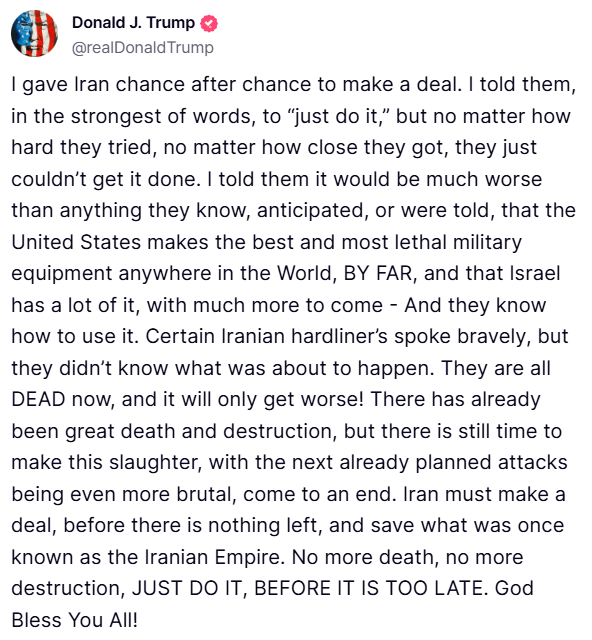
14:08
Iran's Supreme Leader Seyyed Ali Khamenei has pledged a forceful response following Israel's extensive airstrikes on Iranian territory, Azernews reports.
In a televised address to the nation, Khamenei condemned the attacks and ordered the Iranian Armed Forces to be placed on high alert, warning that Tel Aviv's actions will not go unanswered.
The warning comes after more than 200 Israeli Air Force fighter jets reportedly struck over 100 strategic targets across Iran in an overnight assault. The strikes are said to have killed a number of senior Iranian military officers, nuclear scientists, and civilians, further intensifying tensions in the already fragile region.
In response to the strikes, Iran's Crisis Management Headquarters issued an urgent appeal to the public to:
-
Remain calm and avoid panic-driven actions
-
Rely solely on official and national media for updates and guidance
-
Encourage those active in digital and social media spaces to prioritize psychological public safety and refrain from spreading misinformation
This escalation marks a dangerous new phase in the Israel-Iran confrontation and raises fears of a broader regional conflict. With both sides signaling readiness for further action, the international community has expressed growing alarm and is calling for urgent diplomatic efforts to prevent further escalation in the Middle East.
13:30
Iranian media outlets reported loud explosions in the city of Tabriz on Friday, with some saying the blasts occurred near the airport. According to Fars News Agency, a new explosion was heard in the city minutes ago. The outlet also said around 10 locations in East Azerbaijan province were targeted earlier in the day
13:10
Mossad conducted a covert operation inside Iran to destroy missile systems intending to strike Israel, Azernews reports.
תיעוד מטורף: הכוח המבצעי של המוסד בשטח איראן בעת פריסת מערכות תקיפה מדויקות שנועדו להשמיד את מערכות ההגנה האווירית האיראנית pic.twitter.com/X3Xtcc5JJ9
— איתי בלומנטל 🇮🇱 Itay Blumental (@ItayBlumental) June 13, 2025
Iran has appointed Major General Abdolrahim Mousavi as the new head of the General Staff of the Armed Forces, according to a report by Fars News Agency. The move marks a significant shift in Iran's military leadership. Further details about the appointment and its implications are expected to follow.
13:01
The Israeli Air Force bombed Iranian ballistic missiles aimed at Israel in its strikes in Iran earlier today, the military says, publishing footage of the strike. It also publishes a video of strikes on other weaponry in Iran.
The Israeli Air Force bombed Iranian ballistic missiles aimed at Israel in its strikes in Iran earlier today, the military says, publishing footage of the strike.
— Emanuel (Mannie) Fabian (@manniefabian) June 13, 2025
It also publishes a video of strikes on other weaponry in Iran. pic.twitter.com/q5KXxuScbC
12:58
Iran’s main nuclear enrichment facility, Natanz, was damaged in Israel’s attack on Friday, the Iranian atomic energy agency said.
The heavily fortified facility is 150 miles south of the capital Tehran and houses thousands of centrifuges, used to enrich uranium for nuclear energy.
The complex has overground and underground facilities and it’s unclear what was damaged but no casualties were reported, the agency said.
The head of the UN’s nuclear watchdog, Rafael Grossi, said Iranian authorities have confirmed that Natanz was “impacted” but there were no elevated radiation levels.
Grossi told members of the board at the International Atomic Energy Agency that other nuclear facilities in Iran, Isfahan and Fordow, “have not been impacted.”
12:29
Israeli fighter jets have completed a “large-scale strike” on aerial defense arrays in western Iran, the Israeli Defense Forces (IDF) said Friday.
“As part of the strikes, dozens of radars and surface-to-air missile launchers were destroyed,” the IDF said.
The IDF earlier said 200 fighter jets had been used in its unprecedented attacks on Iran.
11:50
Iran requests UN Security council emergency session
Iran has requested an emergency session of the United Nations Security Council to discuss Israel’s unprecedented strikes on the country, the Iranian Mission to the UN told CNN.
The request comes amid growing international calls for calm, after Israel warned its military operation against Iran would continue for days and Iran vowed retaliation.
11:48
Several major airlines have suspended flights to and from locations in the Middle East following Israel’s strikes on Iran Friday, Azernews reports via CNN.
Qatar Airways has “temporarily cancelled flights to Iran and Iraq due to current situation in the region,” the airline said in a statement. Three major airports in Iran, including in the capital Tehran, and five airports in Iraq, including its capital Baghdad, have been affected, the airline said.
Emirates, one of the United Arab Emirates’ flagship carriers, has canceled flights to and from Iraq, Jordan, Lebanon and Iran on both Friday and Saturday, the airline said.
Air India, the country’s flagship carrier, said on X that more than a dozen of its flights had been diverted, or were returning to their origin, “due to the emerging situation in Iran, the subsequent closure of its airspace and in view of the safety of our passengers.” Flights affected include routes from New York, London, Vancouver and Washington.
German carrier Lufthansa said flights to Tehran had been suspended until further notice, and its pilots would avoid Iranian, Iraqi and Israeli airspace for the time being, Reuters reported.
11:42
Azerbaijan has voiced serious concern regarding the intensifying military operations carried out by Israel on Iranian territory, Azernews reports.
The Ministry of Foreign Affairs of Azerbaijan issued an official statement urging both sides to refrain from further escalation and to resolve disputes strictly through dialogue and diplomatic means based on the norms and principles of international law.
The statement emphasized the humanitarian dimension of the conflict:
"We particularly emphasize the importance of ensuring the safety of the civilian population and facilities."
The Foreign Ministry also underlined the need for active diplomatic engagement:
"It is important to continue contacts through diplomatic channels and efforts within the framework of relevant international mechanisms in order to prevent further escalation of the situation in the Middle East."
The appeal comes amid growing regional instability, with Baku reaffirming its longstanding position in favor of peaceful conflict resolution and international cooperation.
11:20
Jordanian state media have reported that the country’s Air Force is intercepting missiles and drones in its airspace, AP reports.
According to the agency, which quoted an unnamed senior military official, the interceptions are being carried out based on military assessments indicating that missiles and drones could fall within Jordanian territory — including populated areas — posing a potential threat to civilian safety.
The official added that the Jordanian Air Force is operating “around the clock to defend the country’s borders by land, sea, and air and will not allow any violation of Jordanian airspace under any circumstances.”
10:59
Israelis stock up on food and water as they prepare for retaliation.
Here in Jerusalem, supermarket shelves are fast depleting with people stocking up on food and water.
Most of the country was woken up at around 03:00 (01:00 BST) this morning with a short burst of sirens and a phone alert warning of a “significant threat” - with people instructed to stay close to a shelter.
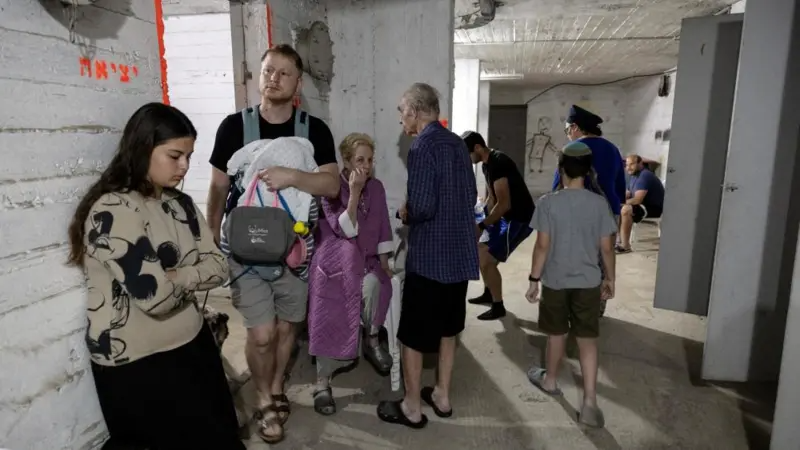
Israel’s emergency services say they are mobilising blood services across the country, while some hospitals say they are discharging patients who are well enough to go home.
In the West Bank, a lockdown has been imposed on all Palestinian cities until further notice.
This is all in preparation for a retaliation - with the Israeli military warning 100 Iranian drones are on their way to Israel.
10:52
Israeli Air Force fighter jets have begun intercepting drones launched from Iran earlier today.
According to a military official, the drones are being intercepted outside Israel’s borders.
Those that are not intercepted earlier are expected to reach Israeli airspace within an hour or so.
10:21
Oil prices have jumped sharply in response to Israel’s airstrikes on Iran, triggering market volatility across multiple sectors. July futures for Brent crude rose by 4.28% to $73.35 per barrel, while July futures for WTI crude increased by 7.95% to $73.03 per barrel.
The escalation has also impacted global financial markets. Major U.S. indices, along with Asian markets, have begun to decline, while safe-haven assets such as the Swiss franc and gold are experiencing upward movement.
The price of a barrel of Azerbaijani oil of the “Azeri Light” brand on the world market increased by 1.28 USD, or 1.77%, reaching 73.45 USD reports.
According to the results of the auctions, the price of August futures of “Brent” brand oil amounted to 70.85 USD.
Meanwhile, the price of a barrel of “Azeri Light” oil on the FOB basis in the Turkish port of Ceyhan rose by 1.25 USD, or 1.76%, to 72.20 USD.
09:43
The IDF has released footage showing Israeli Air Force aircraft being prepared for combat sorties against Iran.
Israel’s military says 200 fighter jets have been used in its ongoing strikes on Iran, according to BBC.
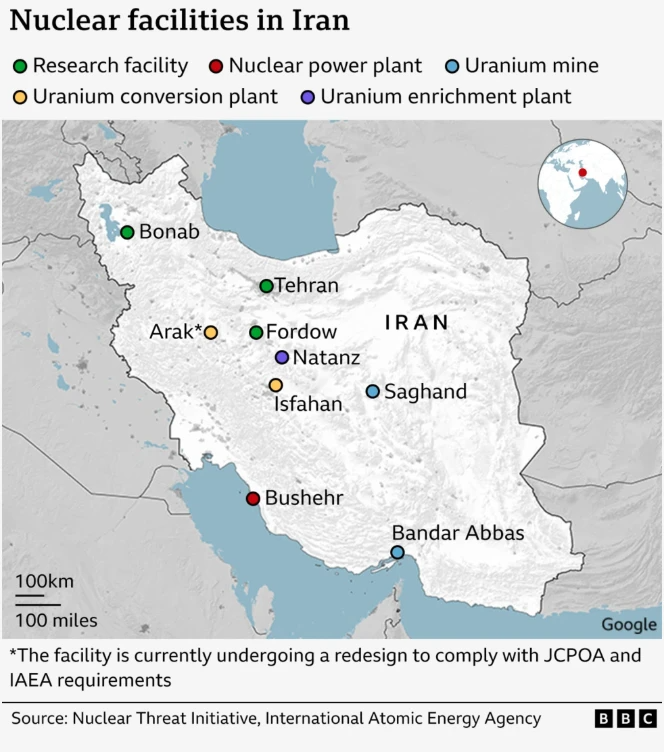
“More than 100 targets have been struck across Iran,” IDF spokesperson Effie Defrin said during a live briefing, adding that “over 330 various munitions” have already been dropped.
Defrin said Israel’s strikes were “part of a precise and synchronized operation” and that its pilots were “still striking military targets and targets from the nuclear program across different areas in Iran.”
09:34
The government of the Islamic Republic of Iran issued a statement in response to the Israeli strikes on Tehran and other cities in the country, which, according to Iranian sources, killed military commanders and scientists.
In the official statement published by the IRNA news agency, Iranian authorities emphasised that the "night aggression of the Zionist regime against the Homeland" demonstrated Israel’s disregard for all international norms and its readiness to "officially and openly commit terrorist acts and ignite war."
"Starting a war with Iran is playing with fire and an act of daring against a lion. Such night operations, especially at a time when diplomatic negotiations on the nuclear issue were underway, reflect this regime’s fear of Iran’s strength and its inability to contain Iran through diplomatic means," the statement said.
Tehran stresses that Israel’s actions in Iranian airspace and the elimination of Iranian commanders "once again prove the terrorist nature of the Zionist regime." Iranian authorities assured that from this moment they are taking all necessary defensive, political, and legal steps to, as stated in the text, "make Israel regret what it has done and deprive the Zionists of sleep."
“The response will be decisive, unified, and uncompromising,” the Iranian government declared. “We have the legitimate right to respond, and we will exercise it. There are no disagreements in Iran today: the entire nation, the state, and the authorities stand united in the face of the aggressor.”
“Revenge for each of our martyrs is inevitable. We call on the UN Security Council to protect what remains of the international order. But even if that does not happen, as the Supreme Leader said, ‘the mighty hand of the Iranian Armed Forces will not let this regime go. Retribution is near—closer than the Zionists’ carotid artery.’”
Iranian authorities assured that the situation is under control and that a response will follow very soon.
“We did not start this. But Iran will write the final chapter of this story,” the statement concluded.
09:22
In the past few hours, Iran has launched more than 100 drones towards Israel.
According to The Times of Israel, this was reported by an official representative of the Israel Defence Forces, Brigadier General Effi Deferin.
He stated that the IDF is taking measures to intercept them.
Deferin clarified that the launches originated from Iranian territory, and it will take several hours for the drones to reach Israeli airspace.
09:17
Iran’s former national security chief Ali Shamkhani, has been killed as a result of Israeli strikes on Iran, CNN reports, citing Iranian state media.
"The assassination of Ali Shamkhani was also confirmed," said the Iranian state news network IRINN.
Shamkhani was a key advisor to Iran’s Supreme Leader Ayatollah Khamenei and served as Secretary of the country’s National Security Council for nearly ten years.
09:05
Iran’s Supreme Leader Ayatollah Khamenei has appointed General Ahmad Vahidi as the new commander of the Islamic Revolutionary Guard Corps (IRGC), replacing the late General Hossein Salami.
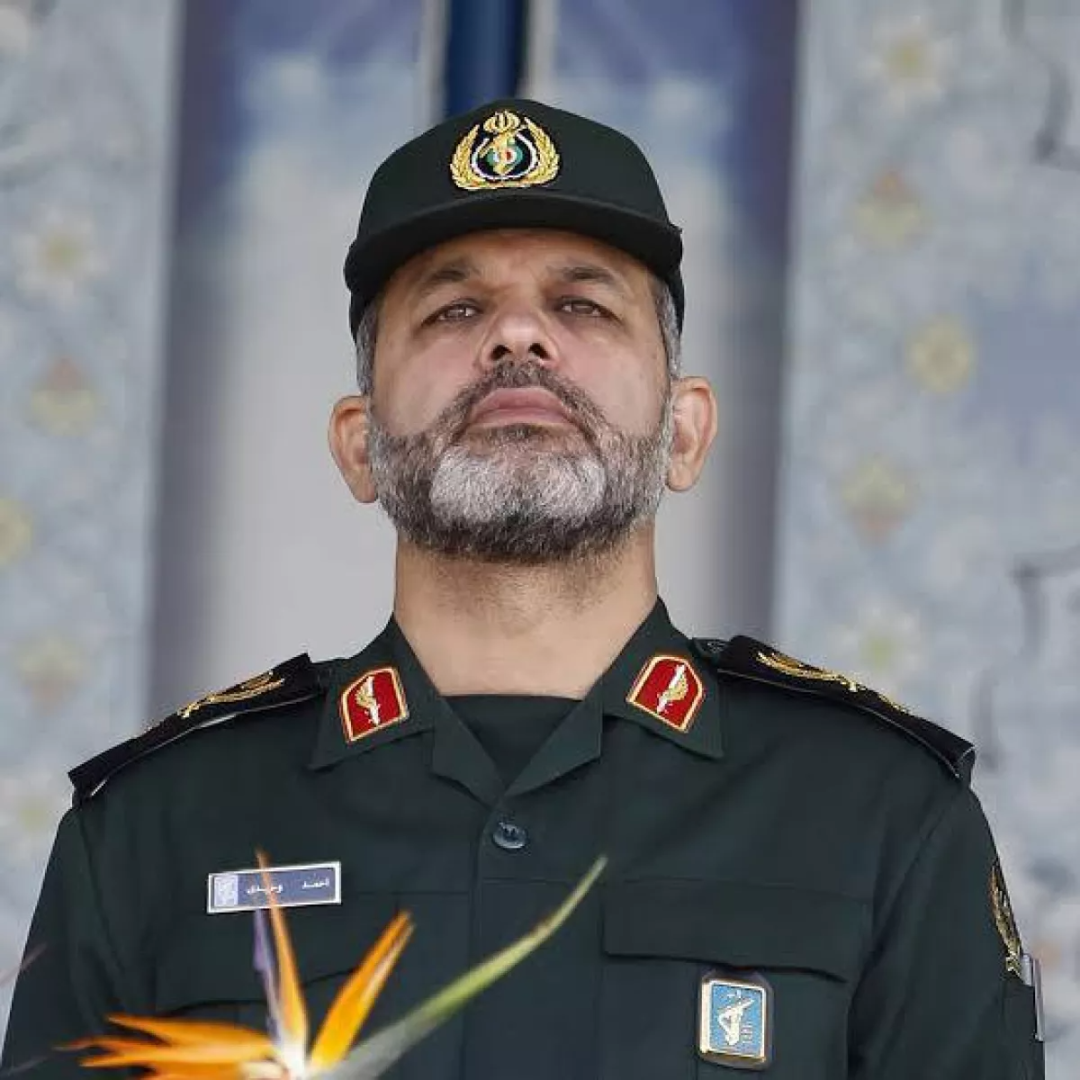
New IRGC commander, General Vahidi.
This was reported by the Iranian news agency Nournews.
Habibollah Sayyari has been named acting Chief of Staff of the Iranian Armed Forces. He will replace Mohammad Bagheri, who was killed in the Israeli strikes.
08:57
Major General Mohammad Bagheri, Chief of Staff of the Iranian Armed Forces, has died as a result of Israeli strikes on Iran, according to the MEHR news agency.
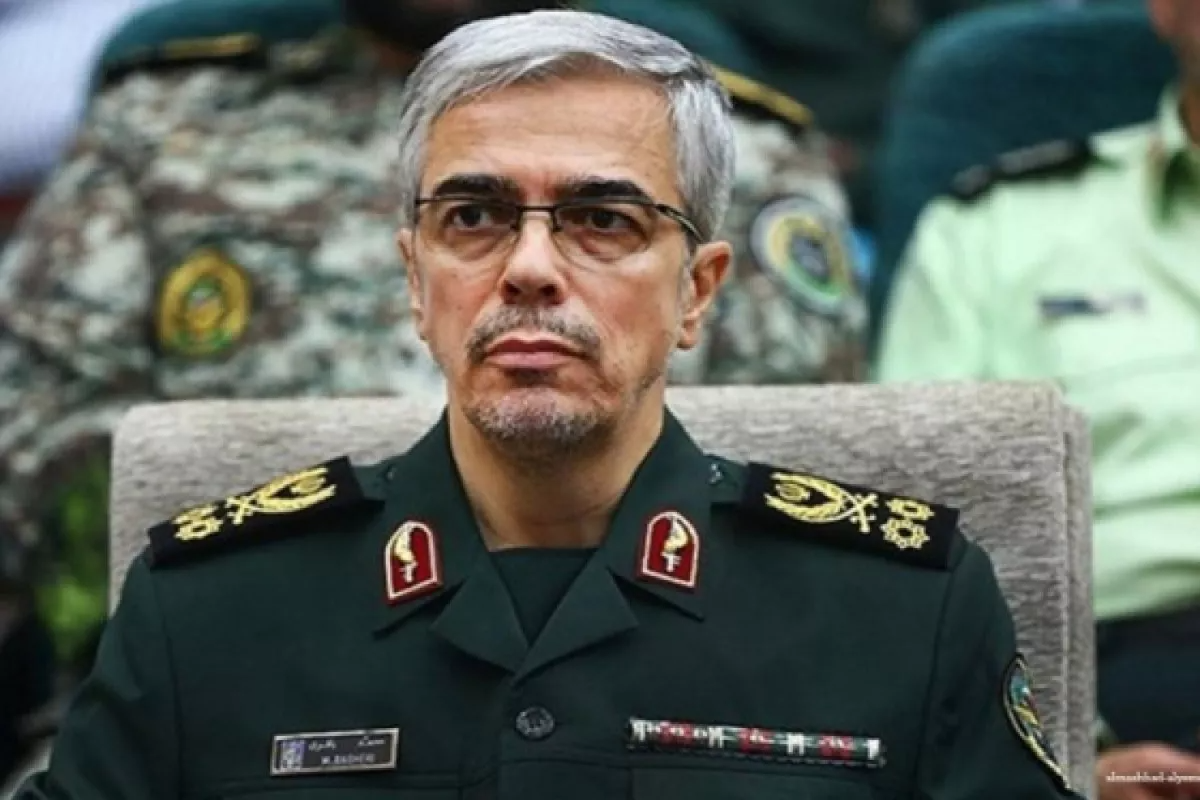
Earlier, the Iranian side denied the death of the general.
08:46
According to Iranian state media reports, several key figures of Iran’s military and scientific establishment were killed in a large-scale Israeli military operation aimed at undermining Tehran’s nuclear program.
Among the confirmed dead are:
– Hossein Salami — Commander-in-Chief of the Islamic
Revolutionary Guard Corps (IRGC);
– Gholamali Rashid — Commander of the Central Headquarters of
“Khatam al-Anbiya”;
– Fereydoon Abbasi — Nuclear scientist and former head of Iran’s
Atomic Energy Organisation;
– Mohammad Mehdi Tehranchi — another specialist in the nuclear
program.
In addition, Ali Shamkhani, one of the closest advisors to Supreme Leader Ayatollah Ali Khamenei, reportedly sustained serious injuries, according to media reports.
The Israeli side has stated that the operation will continue and is aimed at "permanently depriving Iran of the ability to develop nuclear weapons."
08:32
Azerbaijani airline AZAL has cancelled several flights due to the closure of airspace by a number of Middle Eastern countries over security concerns.
Flights on the Baku–Tel Aviv–Baku, Baku–Dubai–Baku, and Baku–Tehran–Baku routes scheduled for June 13 and 14 have been cancelled.
08:24
UN Secretary-General António Guterres is concerned about Israel’s strikes on Iran’s nuclear facilities and urges all sides to exercise maximum restraint. This was stated by Farhan Haq, Deputy Spokesperson for the UN Secretary-General.
"The Secretary-General condemns any military escalation in the Middle East. He is particularly concerned by Israeli attacks on nuclear installations in Iran while talks between Iran and the United States on the status of Iran's nuclear programme are underway. The Secretary-General recalls the obligation of UN Member States to act in accordance with the UN Charter and international law," the statement read.
"The Secretary-General asks both sides to show maximum restraint, avoiding at all costs a descent into deeper conflict, a situation that the region can hardly afford," Haq added.
08:22
Iranian Armed Forces Chief of Staff, Lieutenant General Mohammad Bagheri, was not harmed in the Israeli strikes on Iranian territory, according to the IRNA news agency.
The agency clarified that the general is currently at a command post.
Earlier, Reuters had reported, citing a source, that Bagheri was presumed dead.
08:15
Israeli Prime Minister Benjamin Netanyahu stated that the surprise airstrike on Iranian territory was “very successful.”
“We struck the top command, the leading scientists involved in developing nuclear weapons, and key nuclear infrastructure facilities,” Netanyahu emphasised. “We are achieving success, but I know, and you know: there are no easy wars.”
The Israeli leader also warned that Israelis may have to “spend much more time in shelters than we have been used to until now.”
08:13
Iran’s Foreign Ministry has stated that Israel’s attack on Iran "could not have happened without coordination and authorisation from the United States." The statement was published on the ministry's official Telegram channel.
"The U.S. government, as the main supporter of this regime (Israel), will also be held responsible for the consequences and the dangerous repercussions of this Zionist attack," the message reads.
It’s worth noting that Iranian Armed Forces spokesman Abolfazl Shekarchi also accused the United States of involvement in the strikes on Tehran.
Earlier, U.S. Secretary of State Marco Rubio denied any American involvement in the attacks and urged Iran not to act against U.S. interests.
07:56
Scale of the Strikes: According to Israeli military sources, the attack targeted dozens of sites across Iran. The primary objectives were critical components of Iran’s nuclear programme and facilities associated with the production of long-range ballistic missiles. A source in the Israeli military told CNN the operation “is not limited to a single day.”
Scientists and Generals Targeted: An Israeli intelligence official told reporters that the first wave of strikes included locations where senior Iranian military commanders and nuclear scientists were believed to be present. “The likelihood of their elimination is high and continues to increase,” the official stated.
IRGC Commander Killed: According to several Iranian state media outlets, General Hossein Salami, commander-in-chief of the Islamic Revolutionary Guard Corps (IRGC), was killed in the strikes. However, there has been no official confirmation so far.
Destruction on the Ground: Photos and videos released by Iranian state media show burning residential buildings and plumes of smoke rising above the nuclear facility in Natanz.
Mobilisation and State of Emergency in Israel: Israeli authorities have declared a state of emergency. Schools have been closed, mass gatherings banned, and citizens urged to stay home unless absolutely necessary. Hospitals have been instructed to suspend non-urgent care and switch to emergency protocols. The army is mobilising “tens of thousands” of reservists.
U.S. Response: CNN reports that the Donald Trump administration was informed in advance about the planned strike. However, U.S. Secretary of State Marco Rubio stressed that the United States did not participate in the operation and provided no military assistance to Israel.
Future of Nuclear Talks: The sixth round of the U.S.–Iran nuclear negotiations was scheduled for June 15 in Oman.
07:42
Israel has carried out strikes on three military sites in
northwestern Iran, according to Iranian state television.
"Three military facilities in East Azerbaijan Province were
targeted by the Zionist regime," the provincial emergency
management authority said in a statement broadcast by the state
channel.
07:37
A spokesperson for Iran’s armed forces has stated that the strikes carried out by Israel on Iranian territory were conducted with the support of the United States. This was also reported by Iranian state media.
As previously mentioned, U.S. Secretary of State Marco Rubio has rejected all accusations of American involvement in the operation.
07:28
Iran’s Supreme Leader Ayatollah Ali Khamenei addressed the Iranian people:
“At dawn today, the Zionist regime once again revealed its malicious nature by committing a new crime on the soil of our beloved country, staining its filthy and bloodied hands with an attack on residential areas. This regime must be prepared for severe punishment.”
“The Armed Forces of the Islamic Republic, with God's permission, will not leave this aggression unanswered.”
“Several commanders and scientists were killed in the attack. Their successors and colleagues, with Allah’s help, will immediately carry on their mission.”
“Through this crime, the Zionist regime has set itself on a path toward a bitter and painful fate — and it will inevitably meet it.”
07:18
Chief of the General Staff of the Israel Defense Forces, Lieutenant General Eyal Zamir, stated that Israel is calling up "tens of thousands" of reservists in preparation for further developments following the strikes on Iranian territory.
"We launched this operation because the time had come. We are at the point of no return. We cannot afford to wait. We have no other choice," said Zamir in the statement.
He added that both recent and historical lessons are clear: "When the enemy seeks our destruction, we cannot turn a blind eye. We must fight for our existence. Freedom is granted to those who are willing to fight for it."
It should be recalled that Israeli Prime Minister Benjamin Netanyahu earlier stated the operation against Iran would last several days. Following the strikes on what Tel Aviv calls "nuclear targets," Israel declared a state of emergency — schools are closed, mass gatherings are banned, and businesses have been advised to suspend operations in anticipation of a potential Iranian response.
07:17
Iran has fully closed its airspace until further notice. The announcement was made by the country's Civil Aviation Authority, which also urged citizens not to go to airports. Earlier, authorities had temporarily suspended flights over Tehran, as confirmed by an official NOTAM notice.
07:16
Iranian media are reporting a new wave of Israeli strikes across the country. According to their reports, the current attacks are targeting the cities of Tehran, Ahvaz, and Kermanshah.
06:45
Israeli Prime Minister Benjamin Netanyahu announced in a video statement that the Israeli Air Force had struck Iran’s uranium enrichment centre in Natanz, scientists involved in nuclear weapons development, and facilities he described as the "heart of Iran's ballistic missile programme". He said the operation would continue for several days. "We are at a decisive moment in Israel's history," Netanyahu declared.
Iranian state media and eyewitnesses confirmed explosions in multiple locations across the country, including Tehran and the city of Natanz, home to a key nuclear facility. According to Reuters, Iran’s Supreme National Security Council has convened an emergency meeting.
Both Iranian television and CNN reported the death of General Hossein Salami, commander-in-chief of the Islamic Revolutionary Guard Corps (IRGC), in the strikes. However, this has not yet been confirmed by independent sources.
The Israeli military said the strikes targeted “dozens” of nuclear and military facilities. Israeli assessments claim Iran possesses enough fissile material to produce up to 15 nuclear warheads in the near term.
Israel’s Defence Minister Israel Katz has warned of a possible retaliatory attack from Tehran. “A massive strike on Israeli territory using rockets and drones is expected imminently,” his statement said. A state of emergency has been declared in Israel.
Meanwhile, the United States has emphasised it was not involved in the military operation. Secretary of State Marco Rubio issued a statement confirming the unilateral nature of Israel’s actions. “Tonight, Israel took unilateral action against Iran. We are not involved in strikes against Iran and our top priority is protecting American forces in the region,” he said. Rubio added, “Iran should not target U.S. interests or personnel.”
According to CNN, US President Donald Trump convened an emergency cabinet meeting. The previous day, Trump had acknowledged the possibility of an Israeli strike on Iran, while expressing hope for a peaceful resolution.
Amid the sharp escalation of the conflict, oil prices surged by more than $3 per barrel.
The situation in the region remains extremely tense. International observers warn of the risk of a wide-scale escalation that could develop into a full-scale war with unpredictable consequences for the entire Middle East.
Here we are to serve you with news right now. It does not cost much, but worth your attention.
Choose to support open, independent, quality journalism and subscribe on a monthly basis.
By subscribing to our online newspaper, you can have full digital access to all news, analysis, and much more.
You can also follow AzerNEWS on Twitter @AzerNewsAz or Facebook @AzerNewsNewspaper
Thank you!


